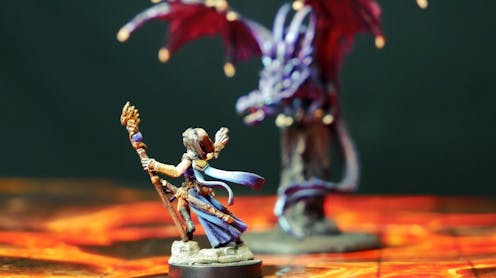Source: The Conversation (Au and NZ) – By Lisa M. Given, Professor of Information Sciences & Director, Social Change Enabling Impact Platform, RMIT University

Shutterstock
Half a century on from its creation, Dungeons & Dragons (D&D) continues to attract millions of players across demographics.
The tabletop role-playing game truly has cemented its position in an increasingly competitive market, valued at more than US$15 billion (A$23 billion) in 2022.
How is a fantasy game from 1974 still capturing the imagination of so many people?
How to play
Tabletop role-playing games are driven by players’ own imaginations. They are a collaborative form of storytelling where players collectively control the narrative and “play” their characters through their words and actions.
In D&D, each player creates a character (such as a human, elf or dwarf, to name a few examples) with unique qualities. Do you like spells? You can be a wizard. Interested in sabotage? Become a rogue. Enjoy combat? You may be a barbarian at heart.
Guided by a dungeon master, your party narrates a quest-filled campaign filled with sticky situations and perilous encounters.
Players roll dice, including a 20-sided die, to dictate what actions they can take. The numbers they roll decided their successes and failures, whether they’re casting spells, picking locks, or attacking monsters.
There are abundant rules, minutiae and lore. But, at its heart, D&D is simply a collective effort to tell a great story.
A global success
More than 50 million people worldwide are estimated to have played D&D. This is immense reach for a game that emerged in the 1970s as a fantasy spin-off from strategic war gaming, where predominantly male players used miniatures to simulate military operations.
D&D’s increased popularity, over the past decade in particular, has been driven by the success of the game’s current version (the fifth edition, released in 2014), the growth in online gaming culture, as well as increased social acceptance of what have historically been considered “nerdy” or “geeky” interests.
Franchises such as Game of Thrones and Lord of the Rings have also helped bring fantasy narratives into the mainstream.
The current D&D edition hits a sweet spot. It’s complex enough to sustain long-standing players, but approachable enough to draw in new people. Following its 2014 release, celebrities such as Vin Diesel and Joe Mangianello made online appearances playing D&D.
In 2016, Netflix’s Stranger Things introduced the game to a massive new audience, as a portrayal of 1980s suburban nostalgia for carefree creative adventures.
Cultural representations of the game are plentiful, including in the 2023 film Dungeons & Dragons: Honour Among Thieves, 2023 videogame of the year Baldur’s Gate 3, podcasts such as Critical Role, and live-streamed D&D campaigns available on YouTube and Twitch.
But as D&D became mainstream, scrutiny followed. The subculture has its share of controversies, including an element of toxic fandom that expresses hostility towards the game’s evolution and diversifying fan base.
As with any growing community, some fans have been concerned with gate-keeping. Some players experience bullying and exclusion, while others find themselves in awkward conversations around the table. This has been a recurring concern for women trying D&D for the first time.
On balance, however, the vast majority of people play to have fun, express their creativity and engage with others. The flexible nature of the game means fans have found endless ways to turn their campaigns into something highly personal and treasured.
D&D continues to evolve through the rich contributions of its fan base, for whom it has become an important outlet for creativity and self-expression.
We all need connection
In challenging times, tabletop games provide inexpensive entertainment, escapism and a way to stay connected to friends and family.
One recent Australian study, of community members playing the game over an eight-week period, found playing D&D decreased players’ depression, stress and anxiety, and increased self-esteem. The authors suggest the game could be used as a wellbeing intervention tool or to prevent mental health issues from arising.
Role-playing games in particular offer psychological support to people of all ages, helping to combat anxiety and build confidence.
This is particularly valuable at a time when social isolation is plaguing communities. Australia’s social cohesion index dropped to its lowest level in 2023. People were concerned about rising household expenses and the state of the economy, with almost half of respondents feeling socially isolated some or all of the time.
During the COVID pandemic, many households in lockdown introduced game nights to entertain themselves. Now, even with restrictions lifted, Australia continues to experience a thriving role-playing and board game movement.
The campaign continues
Around the world, shared public spaces, cafés and pubs offer tabletop gaming spaces to foster community engagement. Public libraries have included spaces for gaming since the 1850s, starting with billiard tables and puzzles, and now including video games.
New social media communities, such as the Latrobe Valley Boardgamers Facebook Group, are frequently popping up for people with shared gaming interests.
In April, the British Library will host a live-streamed event to celebrate D&D’s 50-year legacy – one of many events to be held this year. A new rules update is expected later in the year and is sure to entice fans new and old.
![]()
Lisa M. Given is a Fellow of the Academy of the Social Sciences in Australia. She receives funding from the Australian Research Council, the Social Sciences and Humanities Research Council of Canada, and the Australian Library and Information Association.
Sarah Polkinghorne does not work for, consult, own shares in or receive funding from any company or organisation that would benefit from this article, and has disclosed no relevant affiliations beyond their academic appointment.
– ref. 50 years on, Dungeons & Dragons is still a gaming staple. What’s behind its monumental success? – https://theconversation.com/50-years-on-dungeons-and-dragons-is-still-a-gaming-staple-whats-behind-its-monumental-success-223085







